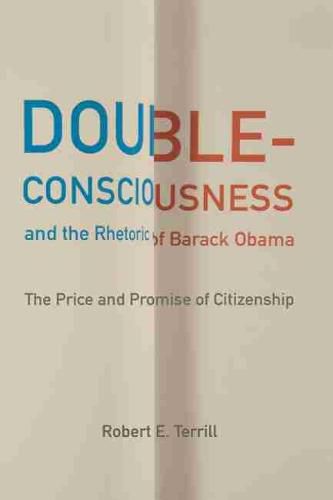Readings Newsletter
Become a Readings Member to make your shopping experience even easier.
Sign in or sign up for free!
You’re not far away from qualifying for FREE standard shipping within Australia
You’ve qualified for FREE standard shipping within Australia
The cart is loading…






Terrill, Robert E. argues that, in order to invent a robust manner of addressing one another as citizens, Americans must learn to draw on the delicate indignities of racial exclusion that have stained citizenship since its inception. In Double-Consciousness and the Rhetoric of Barack Obama, Terrill demonstrates how President Barack Obama’s public address models such a discourse.
Terrill contends that Obama’s most effective oratory invites his audiences to experience a form of
double-consciousness,
which was famously described by W. E. B. Du Bois as a feeling of
two-ness
resulting from the African American experience of
always looking at one’s self through the eyes of others.
It is described as an effect of cruel alienation that can also bring a gift of
second-sight
in the form of perspectives on practices of citizenship not available to those in positions of privilege. When addressing fellow citizens, Obama is asking each to share in the
peculiar sensation
that Du Bois described. The racial history of U.S. citizenship is a resource for inventing contemporary ways of speaking about race.
Joining with other work that suggests that double-consciousness may be a vital democratic attitude, Terrill extends those insights to consider it as a mode of address. Through close analyses of selected speeches from Obama’s 2008 campaign and first presidential term, this book argues that Obama does not present double-consciousness merely as a point of view but rather as an idiom with which we might speak to one another. Of course, as Du Bois’s work reminds us, double-consciousness results from imposition and encumbrance, so that Obama’s oratory presents a mode of address that emphasizes the burdens of citizenship together with the benefits, the price as well as the promise.
$9.00 standard shipping within Australia
FREE standard shipping within Australia for orders over $100.00
Express & International shipping calculated at checkout
Terrill, Robert E. argues that, in order to invent a robust manner of addressing one another as citizens, Americans must learn to draw on the delicate indignities of racial exclusion that have stained citizenship since its inception. In Double-Consciousness and the Rhetoric of Barack Obama, Terrill demonstrates how President Barack Obama’s public address models such a discourse.
Terrill contends that Obama’s most effective oratory invites his audiences to experience a form of
double-consciousness,
which was famously described by W. E. B. Du Bois as a feeling of
two-ness
resulting from the African American experience of
always looking at one’s self through the eyes of others.
It is described as an effect of cruel alienation that can also bring a gift of
second-sight
in the form of perspectives on practices of citizenship not available to those in positions of privilege. When addressing fellow citizens, Obama is asking each to share in the
peculiar sensation
that Du Bois described. The racial history of U.S. citizenship is a resource for inventing contemporary ways of speaking about race.
Joining with other work that suggests that double-consciousness may be a vital democratic attitude, Terrill extends those insights to consider it as a mode of address. Through close analyses of selected speeches from Obama’s 2008 campaign and first presidential term, this book argues that Obama does not present double-consciousness merely as a point of view but rather as an idiom with which we might speak to one another. Of course, as Du Bois’s work reminds us, double-consciousness results from imposition and encumbrance, so that Obama’s oratory presents a mode of address that emphasizes the burdens of citizenship together with the benefits, the price as well as the promise.